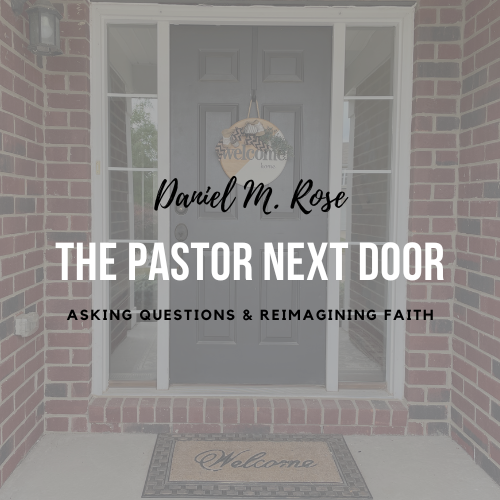Devotional

Psalm 22:23-31; Genesis 16:1-6; Romans 4:1-12
Genesis 16:1-6, which is the opening of the story of Hagar and Ishmael. This tells about how Abraham’s wife wanted a child so badly that she offered up her slave Hagar to Abraham and Hagar conceives. They took the promise God had offered in Genesis 15 into their own hands.
Romans 4:1-12 talks about Abraham’s faith being credited to him as righteousness.
When you read those two passages side by side it is shocking.
Abraham acts in a way that is anything but righteous. He impregnated a woman that is not his wife and he then leaves this woman to be abused by his wife.
Yet, Romans 4 reminds us that this righteousness that was credited to Abraham was not based on anything he did. It was based solely on the promise that God made. His righteousness was credited to him before this scene plays out.
Think about that.
Abraham is deeply flawed, deeply sinful, and in many ways pretty awful. So was his wife.
Yet, he is considered righteous in spite of this.
God’s grace is so overwhelming that even a man like Abraham can become the spiritual father of the nations. God’s faithfulness is greater than any man’s. God’s grace is beyond anything that we can ever imagine.
I am reminded by this passage that I don’t need to take things into my own hands. I can trust the God of grace to bring his plans to fruition. When I trust God there is rest.

Psalm 22:23-31; Genesis 15:1-6, 12-18; Romans 3:21-31
Where, then, is boasting? It is excluded. Because of what law? The law that requires works? No, because of the law that requires faith. For we maintain that a person is justified by faith apart from the works of the law.
All of these passages are remarkable.
I am amazed by the fact that in Genesis 15:12-18 Abram is told there will be a time of enslavement. This promise from God is not going to be simply roses and puppies. No, there would be hardship. There would be need of saving.
Then, this passage in Romans 3 is always one that leaves me shaking my head in awe and amazement. Why? Because it undoes so much of my self-righteousness. It is the great reminder that is Christ’s faithfulness and God’s action that sets people right with God. We don’t add a thing to it. There is nothing that we do.
God in God’s grace sets the world right by Christ’s faithfulness.
The grace that God lavishes on God’s creation is without limit. It is effective and unstoppable. God’s grace brings about its intended result.
I am recognizing again that I need to keep on killing off my ego. There is so much self-righteousness in me that has yet to be dealt with on so many levels.
Today, I’m wrestling with this question, “What do I trust more, my own self-righteousness or God’s grace in Christ?”
Psalm 77; Proverbs 30:1-9; Matthew 4:1-11

The tempting of Jesus in the wilderness by the enemy is one of those stories that I find to be quite insightful. It is also one of the stories that challenges me deeply. I’m not sure that I’d be able to pass the test.
As I think about this passage again this morning I am more and more aware that the interaction has a lot to do with power.
The first temptation is about food. I think I would call this the power to provide. Jesus has been fasting for forty days at this point and the enemy tells him to turn the rocks into bread (there are rocks in Palestine that look like loaves of bread). As a dad and a husband I feel a lot of pressure to provide. Not from anyone else, but from myself. I think if someone said, “Hey here’s this thing, just do this, and you’d have the power to provide forever,” I would probably do it and not think about it. Yet, Jesus in this moment determines to trust God to provide.
The second temptation is what I would call the power to protect. Jesus is tempted to throw himself off the top of the Temple to prove that God would protect him. Yet, Jesus determines not to put God to the test. Again, if I were offered the ability to have unlimited power to protect myself or my family what I do? I would fail the test. I want to say that I’d be willing to hold on to my principles and trust God but, I’m just not sure.
The final temptation is simply power for the sake of power. The enemy says all Jesus has to do is worship the enemy and all the world would be his. What would it take for me to de-center my worship of God? If I was offered the power over the kingdoms of the world would I take it? Again, I hope that I would choose to trust God. But, I just don’t know. In the Lord Of the Rings - Fellowship of the Ring, one of the key moments is when Gandalf refuses to take the Ring of Power from Frodo. He says that he would use it for good but it would corrupt him. When we are promised this kind of power it will inevitably corrupt us.
The upside down way of Jesus is sacrificial love. It is loving enemies and neighbors. It is choosing the cross over saving ourselves.

Psalm 77; Job 5:8-27; 1 Peter 3:8-18a
Summing up: Be agreeable, be sympathetic, be loving, be compassionate, be humble. That goes for all of you, no exceptions. No retaliation. No sharp-tongued sarcasm. Instead, bless—that’s your job, to bless. You’ll be a blessing and also get a blessing.
No exceptions.
It seems that we live in a world where we try to make exceptions to living the way that Peter describes here all the time. To seek to be agreeable, sympathetic, loving, compassionate, and humble we are told simply do not work any more.
It’s a fascinating thing to me that many Christians will tell you that we ought not live by these principles because it means that “enemies” of the faith will win.
We have so lost our way that to live by these principles is something that is considered “weak.”
No exceptions.
There is not any wiggle room here. There’s no “…but politics” or “…but culture war.”
Nah, if I claim to follow Jesus I am to live this way, all the time, no exceptions.
If I am trying to make excuses or devise exceptions to live as one who is agreeable, sympathetic, loving, compassionate, and humble then I need to take a good long look in the mirror.
Psalm 77; Job 4:1-21; Ephesians 2:1-10

I yell out to my God, I yell with all my might, I yell at the top of my lungs. He listens.
I’m not sure that there is a more comforting phrase for me in all the Scriptures than, “He listens.”
“He listens,” is a complete sentence.
It is remarkable to me that when I cry out to the Divine the Divine listens. I am constantly on a quest to understand what amazing grace means. As I sit here this morning with many things on my heart and my mind, I am struck by the reality that it is amazing grace that God listens.
Why would God listen to me? What is it about me that God would take any notice? Why would God care about what I have to say?
Because God loves me.
I love my children with all of who I am. When they talk, I listen. Even when they were small and couldn’t speak coherently I took great joy in listening to their rambling and mumbling. I don’t know anyone who ignores a baby that is talking to them, particularly when it’s your own child.
I imagine this must be what it’s like for God. This Creator God, the holy one, the sustainer of the universe, loves his creation without condition. This love, apparently, leads God to this place of intimacy where God listens.
This morning I’m pondering this question, “Do I really believe that God listens because he loves me?”
Why Them?
Psalm 25:1-10; Psalm 32; Matthew 9:2-13

Later when Jesus was eating supper at Matthew’s house with his close followers, a lot of disreputable characters came and joined them. When the Pharisees saw him keeping this kind of company, they had a fit, and lit into Jesus’ followers. “What kind of example is this from your Teacher, acting cozy with crooks and misfits?”
This story about what happened after the calling of Matthew resonates so deeply with me. I just love everything about it. First, the fact that Jesus calls Matthew, a tax collector, to join him as a disciple makes me smile. Tax Collectors were (and are) some of the most despised people in Palestine. He was considered a traitor to his people. Matthew was probably skimming and probably taxing the people a bit more than he ought to line his own pockets. Matthew was not a guy that anyone in Jesus' merry band would have chosen to associate with.
But, then it gets better.
Matthew throws Jesus a party and all kinds of disreputable characters show up. The Pharisees are nearly apoplectic.
Over the course of my years in ministry I have found myself associating less and less with church people. I find myself standing on the outside looking in at Christian subculture. My people are the ones at the pubs and cafes.
It’s pretty funny to receive the scorn of the modern day Pharisees.
I imagine Jesus just smirking and shaking his head as he responded to their critique, “Who needs a doctor: the healthy or the sick? Go figure out what this Scripture means: ‘I’m after mercy, not religion.’ I’m here to invite outsiders, not coddle insiders.”
Too many of us are way too worried about being “above reproach” and not worried enough about loving well.
It’s just too easy to get focused on coddling insiders than it is to invite outsiders. For pastors, in particular, the insiders are our “customers.” We forget that our primary responsibility is not to the 99 but to the 1. What’s just as sad is that the 99 forget that they were at one time the 1.
This morning I’m pondering the reality that as a pastor I have this dual calling. The call to care for the insiders and those on the outside. How do I orient myself to this dual calling? How do I consistently hold a posture of loving well?
Rejoice and Endure
Psalm 25:1-10; Daniel 9:15-25a; 2 Timothy 4:1-5

But you—keep your eye on what you’re doing; accept the hard times along with the good; keep the Message alive; do a thorough job as God’s servant.
Every time I read this little passage from 2 Timothy 4 and Paul’s charge to his protege, I am reminded that there are always two kinds of times. There are good times and there are bad times.
I too often forget that reality.
I tend to be a bit of an optimist and assume that good times are the standard. I have friends who are a bit more on the pessimistic side of the coin and they assume that bad times are the standard. But, the reality is somewhere in between, both good and bad times. We should expect both.
Beyond that, I need to recognize that in anything, good or bad, that it is never all good or all bad. No, the good and the bad are intermingled together. Often times we cannot pull them apart. An honest assessment of any situation is the both/and not the either/or.
As I continue to grow and mature I find that understanding that in any situation there are both good and bad to it, I am able to find contentment.
Paul is famous for saying that he has learned to be content in any situation. I am beginning to believe that contentment is rooted in his understanding that good and bad are intertwined. In other words he expects to experience both. When the good comes, he rejoices. When the bad comes he is not surprised but is able to endure.
I think enduring the bad is able to be done because we are confident that the good is coming.
One of my favorite bands, The String Cheese Incident have a song called “Good Times Are Around The Bend”. It’s a joyful reminder that though we may face something hard, there will be good at some point.
Life is not dualistic. It’s a constant continuum. It’s not either/or but both/and. Not good or bad. But, good and bad inseparably mixed together so that we may rejoice and endure.
One Who Receives Grace
Psalm 25:1-10; Daniel 9:1-14; 1 John 1:3-10

This passage from 1 John almost feels contradictory.
On the one hand, if we claim to be in the light but still bounce around in darkness we are liars. One the other hand, if we claim to be without sin then we are also liars.
It almost seems hopeless, doesn’t it?
How can someone be in the light and still be struggling with sin? Aren’t we supposed to be perfect and holy? Aren’t we supposed to be free from the darkness?
This to me is the beauty of the Way of Christ. There is a standard that we are called to, a standard of holiness in the light. Yet, there is a reality that we will not be perfect and we will struggle with things. The Way of Christ simply says, “Own it. Embrace the reality that you need grace, forgiveness, and mercy."
To be in the light is not to be perfect. To be in the light is to be honest. To live with integrity. To be one who acknowledges one’s own imperfection.
To be one who receives grace.
What an overwhelming thought! To be in the way of Christ is to be one who receives grace. To be in the way of Christ is not to be perfect, it is not to have it all together, it is recognize that I don’t have it all together and nobody else does either.
So, grace abounds!
Push Comes to Shove
Joel 2:1-2, 12-17; Isaiah 58:1-12; Psalm 51:1-17; 2 Corinthians 5:20b-6:10; Matthew 6:1-6, 16-21

Today is Ash Wednesday the beginning of Lent. For the next 40 days Christians around the world will fast in various ways to prepare for the coming of Resurrection Sunday. This is the high holy day where we celebrate the resurrection of Christ. It was this moment that sets Jesus apart from all other would-be messiahs. The empty tomb is the key moment of our faith.
Ash Wednesday is the stark reminder that get to the resurrection Christ first had to go to the cross.
Many will wear ashes on their foreheads today to remind them of their mortality. The ashes signify that from dust we came, to dust we return. Just as Christ died, so too will we die.
The passages for today's readings point us in the direction of why there was a cross. There was a cross because we through our hypocrisy had separated ourselves from God.
Even though we might act like we honor God, in our hearts there is something else going on.
What is it? What else is going on?
It is this desire to honor ourselves. It is humanity playing out the temptations in the wilderness between Jesus and The Accuser in each of our own lives. Sadly, if we're honest, many times when push comes to shove we fail the test. When we do, we create separation between us and God.
In our humanity we are frail. In our humanity we are often given to the path of least resistance, whatever is easiest or makes us “happy” in the moment. In our humanity we often care more about looking the part than being the part.
We are reminded on this Ash Wednesday that though there was separation there is no more. Resurrection is coming. Death has been defeated. Reconciliation is ours because of the victory won on the cross and displayed in the resurrection.
—
If you made it this far, thank you for reading! If you found this helpful, insightful, interesting, or even just kind of average, would you please share it with your social feed?
If you aren't receiving these posts in your inbox please subscribe right here:
The Mystery of Following
Psalm 110:1-4; Job 19:23-27; 1 Timothy 3:14-16

I hope to visit you soon, but just in case I’m delayed, I’m writing this >letter so you’ll know how things ought to go in God’s household, this >God-alive church, bastion of truth. This Christian life is a great >mystery, far exceeding our understanding, but some things are clear >enough: *He appeared in a human body, *was proved right by the invisible Spirit, *was seen by angels. *He was proclaimed among all kinds of peoples, *believed in all over the world, taken up into heavenly glory.
I am always and consistently struck by the both-and of Jesus. Both a human and taken up to glory.
As I consider again this great reality of the dual nature of Christ, fully man and fully God, I am left in awe.
What leaves in even greater awe is what the author of 1 Timothy says right before the creedal statement, “some things are clear enough.”
The nature of Christ is clear enough. I think it's because it is grounded in the humanity of Jesus. We don't consider the humanity of Jesus well enough. The reality of him being alive and living in this world is something that we just don't let our minds and hearts consider. We are so deeply caught up in the cosmic Christ, this divine being that does all the miracles and conquered death.
But, the humanity of Jesus is what grounds him in reality. He gets hungry, tired, annoyed, angry, has conflict with family, is accused of being a drunk and a glutton. He has friends who he teases. He gets betrayed.
This Jesus of history and time is the Jesus that I can look at and say to myself, “Yep, I know what he's going through.”
Isn't it interesting that the mystery is the life of following Jesus. The mystery is not Jesus himself.
This makes so much sense if we take the Christian life seriously. If we actually try to live the things of the Sermon on the Mount, we are left wondering if this even possible.
This way of Jesus is a great mystery. There is grace upon grace. The rules are left under the auspices of love. This often leaves us wondering, “what do I do now?” The way of Jesus responds, “what is the way of love? of grace? of mercy?”
So, we are left to ponder afresh the Jesus of time and history and to wade into the mystery of how to follow him.
—
If you made it this far, thank you for reading! If you found this helpful, insightful, interesting, or even just kind of average, would you please share it with your social feed?
If you aren't receiving these posts in your inbox please subscribe right here:
An Invitation to Come On Over!

It was a beautiful Spring day and I was enjoying some time on the patio. When all of a sudden, Ethan rushed in, a bit flustered and frustrated.
"Dad, as I was coming into the neighborhood I blew my tire out."
We both took a deep breath and headed over to where his car was parked and began the process of changing the tire. The tire iron we had didn't fit his lug nuts. So, we knew that we needed to call our local mechanic, Brian. We rang him up and he gave us a few different tools to try.
None of them worked.
Our neighbor, Allan, popped his head out of his car as he was pulling into the neighborhood and offered up a piece of advice, "My car has this special adapter that I have to use to get the lug nuts off my wheels, maybe yours does?"
Of course! The lug nut key! It was in his glove box and before we knew it, we had the tire off and changed.
Sometimes, we need an expert's help on figuring out a problem. Sometimes, we need a neighbor's help to solve a problem. Do you know what's ideal? When you have both.
Some Context...
Many of us grew up going to church (or being dragged there) and some of us didn't. Some of us are in the early processes of discovering faith and some of us are questioning everything we believe.
Wherever we we are in the process, too often we believe we are alone to figure it all out. But, we're not.
The questions you have are the same ones that others have wrestled with over the years. I am coming to believe that a significant aspect of the human experience is to wrestle with the mysteries of our existence, to wrestle with the questions of ultimate meaning, and to wonder about the divine. Regardless of where one ends up, these questions, doubts, beliefs, and musings are the stuff that make life deep and rich and interesting.
It gets even more interesting (and dare I say, fun) when we tease these things out in community. That's what I want to try to create. I want to invite you into a community that is asking questions and re-imagining faith with the added bonus of a neighbor who is a bit of an expert on some of these questions.
If I have a problem with my car, I call Brian. When I have a question about real estate, I call Todd. When I have a question about interpersonal stuff, I call The Beard. Often, these calls take place in a bit of a broader community too. When these guys have questions about religion, spirituality, or faith they often call me.
Welcome to the Neighborhood!
The Pastor Next Door is an invitation to community and and invitation to access. Not all of us have a pastor next door that we can ask questions of whenever we want.
If you're reading this, you do.
I hope that you will engage by commenting on posts, becoming involved in a new Facebook Group that I will be launching soon, and joining me for live in person meet ups and virtual live gatherings. You can also sign up to block out one-on-one time with me.
To make a long post really short, come on over, pull up a chair and let's ask questions and re-imagine faith together.
Use Your Head and Heart
John 7:20-24
How do I know what's right?
That's a question that plagues many of us. It seems to find us everywhere we go. As we scroll the social media feeds or we see the news or as we parent or as we talk with friends, this question is lingering in the background.
So what do we do?
When we are young what is right and what is wrong is easy. If you don't realize this you haven't spent much time with three and four year olds. There's right, there's wrong, there's nothing in between.
Somewhere around six or seven we discover "rules". They are wonderful. Because now there is a basis for what is right and wrong. The "rules" say so. Arguments about rules break out every day on playgrounds around the world.
I'm guessing around ten or eleven, older siblings figure out that they can now use the "rules" to their advantage. So, they change the "rules" mid game to ensure victory. Because now what is right and wrong is really determined by our desired outcome.
It's at this point that everything really changes.
If you don't know this, then you haven't spent much time around middle school kids.
From here on out this question of what is "right" spirals into a multitude of shades of gray.
And yet, "what is right?", follows us like a shadow.
Jonathan Haidt in his seminal text, The Righteous Mind, argues that this desire to be right or to pursue righteousness is at the heart of all that we do as people. Often what helps us determine what is "right" is deeply rooted in what community we bind ourselves to. As a result, we are able to blind ourselves from the claims of what is "right" from those outside our selected tribe. This means that most of our decisions about what is "right" are not the rational decisions that we think they are. According to Haidt we back fill emotional moral intuitions with rational arguments.
As I ponder this it strikes me that once we take notice of how this plays out in ourselves then we can try to intentionally push against it. By taking note of the intuitive or emotional, first recognizing it, then seeing it for what it is, I can try to slow it down and balance it with reason.
There was this one time when Jesus was dealing with the some religious folks. They were upset with him because he had healed a guy on the Sabbath. From sundown on Friday until sundown on Saturday the people of Israel were not supposed to do any work. Yet, over the ages they had written in some exceptions like saving an animal from falling into a hole or even circumcision. Why? Because they had determined those things were "right." Jesus healed someone on the Sabbath and folks lost their minds. This was "wrong."
So what was Jesus going to do? How would he respond?
He said, "Don't be nitpickers; use your head--and heart!-- to discern what is right, to test what is authentically right."
I think Jesus knew something about us people that we don't. I think he inherently knew that we get the head and heart backwards when it comes to the question of "what is right?". If he had said, "You're simply responding out of your bound emotional moral intuition, you need to bring your rational thought more into this," the folks would not have heard him. You see, we think that every decision we make is with our rationality. But, the reality is that it's the opposite. When he said, "and heart," I think he's really challenging them to engage their rational thought on a deeper level.
When we are wrestling with the question of "what is right?", we need head and heart. What is authentically right often goes to a place deeper than simply a black and white rule. It demands that we enter into a depth that requires us to bring more of ourselves. If we are going to answer the question, "what is right?", and be even close to what is right, then we have to remove the blinders that we have put in place due to our tribal allegiance.
If we could do this, we could move beyond a dualism of right or wrong and towards something approaching justice and righteousness. These goals are found over the horizon of right or wrong.
How might your perspective on right or wrong change if you chose to think through some of the moral issues facing you through the lens of a different tribe? Or how have you been blinded because of your tribal allegiance? What does it look like for you to bring head and heart together and to stop nitpicking?
Just Making Ourselves Look Good
John 7:14-20
Have you ever been around a "one upper"? Or maybe, you are a "one upper"?
You know what I'm talking about, don't you? That person who upon hearing a story from someone else always has another story that one ups the person before. The thing is, most of those folks are likely making it up. They want the people listening to the story to be amazed and to embrace them.
The religious world these days is full of people who are simply making stuff up. I'm sure if I took the time to dig into other religious traditions that I could find examples across the board. I'm most knowledgeable of Christianity and even more so about American Protestant Christianity, and so that's the context that I'm thinking through.
As I look at social media screes and see some of the stuff that finds its way onto television, I am struck by how little it resembles the gospel. The rage fueled preaching and tweeting are heartbreaking. Yet, many do so because it gets them traction. The crowd applauds and let me tell you, the applause is addictive. What they say and post are simply designed to make themselves look good with little connection to reality.
Jesus once said, "A person making things up tries to make himself look good. But someone trying to honor the one who sent him sticks to the facts and doesn't tamper with reality."
Read that again.
If I put that into my own words, I'd say, "When we forget who we are really are, we lose the plot."
So many of us have lost the plot. We've lost our sense of self. We have become so bound to our political tribe that we have become blind to reality. As a result, we "tamper with reality."
You likely remember the famous, "alternative facts," from a former White House staffer. It's become a bit of a punchline. Sadly though, this has become the way by which many of us live and move out in the world.
Why? Because many Christians and Christian leaders have forgotten who sent them. Instead of honoring the Divine by sticking to reality, they simply seek to make themselves look good.
It is almost as if many of us are ashamed to be a people that can choose to love neighbor and enemy.
It's as though we are ashamed of our identity as a people who have received grace, mercy, and forgiveness and as a result are called to offer the same.
It is as if we are ashamed to be following the Christ that willingly chose to sacrifice himself for the sake of bringing reconciliation to all of creation.
I need to constantly remind myself who sent me. It is here that I find my truest self. When I rest most fully in the mystery of the Divine through Christ then I find little need to make myself look good. In those moments, and to be sure they are moments,
I lose my need to be right and find a holy desire to get it right.
I lose my self righteousness and find gracious submission.
I lose my desire to make myself look and find reality.
How about you? As you reflect on the way you move out in the world, are you someone seeking to make yourself look good by manufacturing your own reality or have you found yourself and are willing to embrace true reality? Let's talk about it in the comments.
Nerd Note: It strikes me that the story of Wanda Maximoff (The Scarlett Witch) could be easily seen as a modern parable of this truth.
Humility or Fear?
John 7:1-13
The great theologian Michael Scott once said, "Would I rather be feared or loved? Um... easy, both. I want people to be afraid of how much they love me."
This always makes me chuckle because it rings so true.
What kind of leader is a good leader? The one who casts fear in their followers or the one that creates love? I think we would say the latter, yet so much of what we see in our institutions is the former. It's as if we don't really believe that it's possible to lead from a place of love or humility.
I think one way to think about humility is to think of it as the application of love from a position of power.
What do you think? How would you define humility in the context of leadership?
This morning I read this story,
Later Jesus was going about his business in Galilee. He didn't want to travel in Judea because the Jews there were looking for a chance to kill him. It was near the time of Tabernacles, a feast observed annually by the Jews.
His brothers said, "Why don't you leave here and go up to the Feast so your disciples can get a good look at the works you do? No one who intends to be publicly known does everything behind the scenes. If you're serious about what you are doing, come out in the open and show the world." His brothers were pushing him like this because they didn't believe in him either.
Jesus came back at them, "Don't crowd me. This isn't my time. It's your time—it's always your time; you have nothing to lose. The world has nothing against you, but it's up in arms against me. It's against me because I expose the evil behind its pretensions. You go ahead, go up to the Feast. Don't wait for me. I'm not ready. It's not the right time for me."
He said this and stayed on in Galilee. But later, after his family had gone up to the Feast, he also went. But he kept out of the way, careful not to draw attention to himself. The Jews were already out looking for him, asking around, "Where is that man?"
There was a lot of contentious talk about him circulating through the crowds. Some were saying, "He's a good man." But others said, "Not so. He's selling snake oil." This kind of talk went on in guarded whispers because of the intimidating Jewish leaders.
John 7:1-13, The Message
Jesus chose humility. His brothers wanted him to go do something big and public. Their assumption was that Jesus was all about becoming a public person. But, that wasn't it at all. Jesus had a specific purpose and calling. This calling demanded humility, love applied from power.
As I grow older the greatest miracle that I think Jesus ever did was being born into the human frame. The dual nature of Christ, both God and Man, is something that is beyond remarkable and we don't think deeply about it. It is a mystery of mysteries. Yet, it is where these two natures meet that we can find and know the true humility of Christ.
Everything that Jesus did was the application of love from a position of divine power.
This is in stark contrast to the religious leaders of his day. How did they move through the crowds? They did so through intimidation. Or as the NIV puts it, by fear.
Elsewhere in the ancient text we come across this line, "Perfect love casts out fear. (1 John 4:18)"
The application of love from the position of divine power drives out fear! Christ moved through the crowds in humility, the religious leaders did so through intimidation.
As I think about what it means to be a leader I think we need to intentionally follow the way of Jesus. Whether we are leading as parents, in business, in athletics, in school, in the church, or in any other social setting, our goal should be the application of love from the position of power.
Humility or fear? One is really hard. One is really easy. Which do you choose?